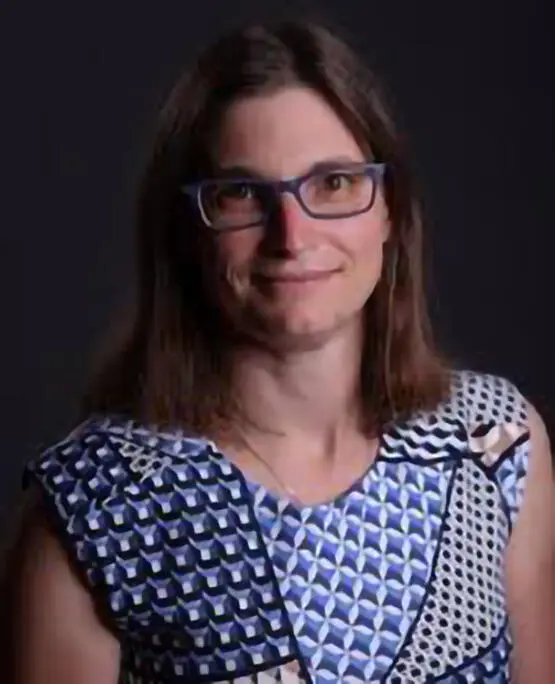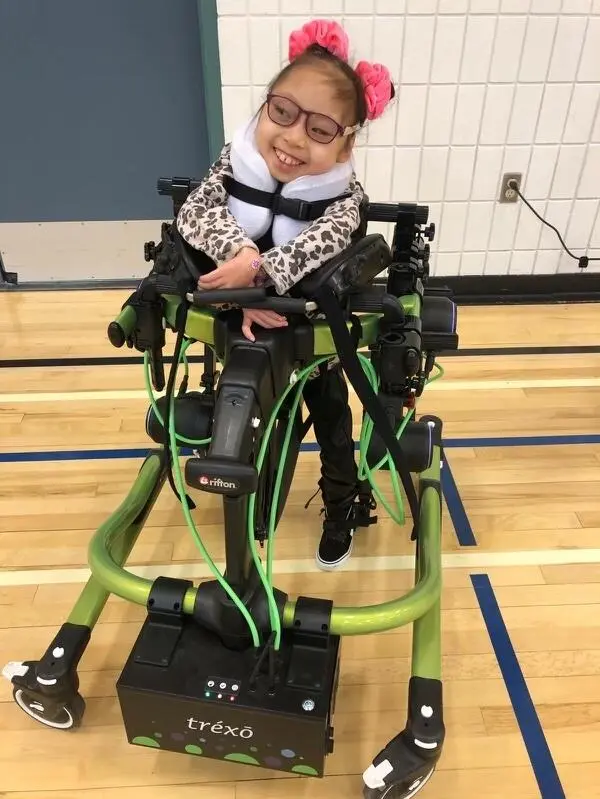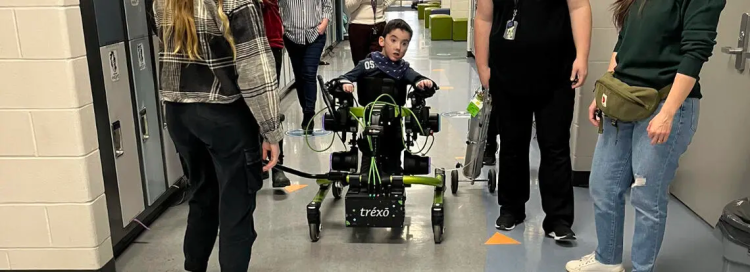Thousands of Canadian children are unable to walk due to neurodevelopmental conditions like cerebral palsy, spina bifida or Rett syndrome. Dr. Elizabeth Condliffe, MD, PhD, partners with experts from the innovation community to investigate the benefits of robotic walking devices for children. With support from an Owerko Centre Catalyst grant - made possible by generous community support through the Alberta Children's Hospital Foundation - her team is leading a pilot study to examine the use of these devices in schools.
Condliffe is a clinician-scientist and assistant professor of physical medicine and rehabilitation at the Cumming School of Medicine, and she leads the Pediatric Onset of Neuromotor Impairments (PONI) Lab at UCalgary. Her research focuses on understanding the mechanisms behind motor impairments and neuroplastic recovery with the goal of improving clinical interventions.

Elizabeth Condliffe (Photo Courtesy Elizabeth Condliffe)
Condliffe collaborates with Trexo Robotics, a company founded in 2011 by Manmeet Maggu and Rahul Udasi. Maggu and Udasi invented the Trexo walking device, the inspiration for which came from Maggu's nephew Praneit, who has cerebral palsy and cannot walk. The Trexo device attaches to a walker and its robotic legs allow a child to move their body from an upright position giving them the chance to participate in daily life in entirely new ways.
Empowering children through movement and connection
"Use of a robotic walking device has shown improved motor function, specifically head and posture control. We also have some promising early results related to bone health," says Condliffe. Parents have also reported changes related to physical activity including improved sleep as well as cognitive and language development. "We know that cognitive development is improved through physical activity so that may be why we're hearing about those unexpected benefits," she adds.
The challenge with the technology is that it is big, expensive and requires adults to assist with its use - all of which pose barriers to families wanting to access the device for their children. Oftentimes innovations like this can get stuck when it comes to implementation. Condliffe and her team are determined to find strategies that work and have found that school settings provide a practical solution.

Cundliffe and her team will study the logistics of using the Trexo in schools, Photo Courtesy Elizabeth Condliffe
Bringing a robotic device into a school setting with practitioners who can help with its use, gives children the opportunity to participate more fully in classroom activities. Joining in stand-up lessons in music or gym class or taking part during recess and lunchtime offer both physical and social benefits.
"A really important part of our work is exploring those social encounters and how a robot assisted walking device can allow children to interact with friends and family in new ways," says Condliffe. "Many have told us about the value of having this cool device' rather than being treated differently because of their mobility equipment. Families have also told us how meaningful it is to go for a walk with their child and hold hands."
Condliffe tells the story of the first child she worked with to use the Trexo device in a school setting. "She walked down the hallway with students lined up on either side. You could see their smiles. One of them shouted, wow! I didn't know she could do that.' For that child using the device, it was a moment of being admired and included in a new way," says Condliffe.
Paving the way for school-based implementation
With the Owerko Centre Catalyst Grant, Condliffe's team is leading a pilot study to examine the logistics of using the Trexo at schools. While the device has been tested in schools before, much more data is needed to identify strategies to best partner with school boards and provide the exact support that school administrators need.
"Owerko Catalyst Grants help research ideas get off the ground and to the next level," says Dr. Susan Graham, PhD, Director of the Owerko Centre. "The work that Dr. Condliffe and her team are doing with the Trexo device is inspiring and we're proud to support the next stage of investigation to bring these benefits to more children."

Catalyst grants support teams undertaking research for children with neurodevelopmental conditions, Photo Courtesy Elizabeth Cundliffe
Having identified barriers in previous studies, Condliffe's team has developed solutions. "We have enough evidence to know what benefits the device can bring," says Condliffe. "Now it's about understanding how those benefits show up in school settings, what makes the setting equitable and what supports are needed." Eight participants with neurodevelopmental disabilities who primarily use wheelchairs will take part in this pilot study. The findings will optimize Condliffe's strategies and lay the groundwork for a larger, multi-site trial. The end-goal is to create a sustainable school implementation plan where access to the Trexo device can be offered to many students across the community.
Congratulations to the 2025 Owerko Centre Catalyst Grant recipients
Funded by generous donors to the Alberta Children's Hospital Foundation, Catalyst Grants are offered annually and support research teams that are unlocking discoveries and supporting children with neurodevelopmental conditions and their families. Representing basic science, clinical research and social and population health, each project brings a diverse range of expertise to understanding neurodevelopment and neurodevelopmental conditions.
- Advancing the study of child and youth flourishing: research from the All Our Families Study
Principal Investigator: Dr. Zahra Clayborne, PhD, Departments of Community Health Sciences and Pediatrics, Cumming School of Medicine - A Pilot Study of UPLIFTS: Upright Participation for Learners: Implementation of Flexible use of roboT-assisted walking in Schools
Principal Investigator: Dr. Elizabeth Condliffe, Clinical Associate Professor, Pediatric Rehabilitation Medicine, Cumming School of Medicine - Ecological momentary assessment to measure thought regulation and predict affect in youth with neurodevelopmental conditions
Principal Investigator: Dr. Julia Kam, PhD, Assistant Professor, Department of Psychology, Faculty of Arts
Elizabeth Condliffe, MD, PhD, is a clinician-scientist, assistant professor of Physical Medicine and Rehabilitation in the departments of Clinical Neurosciences and Pediatrics at the Cumming School of Medicine (CSM), and adjunct assistant professor in the Faculty of Kinesiology. She also leads the Pediatric Onset of Neuromotor Impairments (PONI) Lab at UCalgary. She is a member of the Owerko Centre, Alberta Children's Hospital Research Institute (ACHRI) and Hotchkiss Brain Institute at the CSM.
Condliffe's work with Trexo Robotics and research of the Trexo robotic walking device has been supported by the Alberta Children's Hospital Foundation (ACHF) including their support of the UCeed Health Fund and the Vi Riddell Children's Pain and Rehabilitation Centre, along with the Robertson Fund for Cerebral Palsy Research at Hotchkiss Brain Institute, the Kids Brain Health Network, and One Child Every Child.
Susan Graham, PhD, is Director of the Owerko Centre at the Alberta Children's Hospital Research Institute (ACHRI) and Scientific Director of UCalgary's Azrieli Accelerator. She is a professor in the Department of Psychology in the Faculty of Arts and a member of the Owerko Centre, ACHRI, and the Hotchkiss Brain Institute at the CSM.
With support from the Alberta Children's Hospital Foundation, the Owerko Centre at the Alberta Children's Hospital Research Institute brings together researchers and trainees as a multidisciplinary research hub with a broad focus on neurodevelopment, neurodevelopmental conditions and child mental health.













